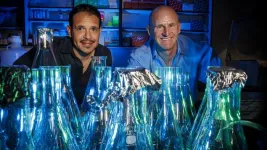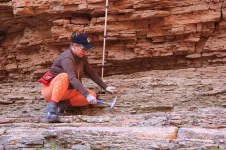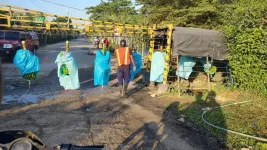(Press-News.org) To get a good sense of a country’s level of development, you need to look at the items people have in their homes, according to economists Rutger Schilpzand and Jeroen Smits from Radboud University. Research on low- and middle-income countries often focuses on income, health or education, but that doesn’t tell you the full story of a country’s situation. ‘That’s why, for the first time, we are mapping out how the material wealth of households is developing,’ Schilpzand explains. The researchers coin this material wealth growth for households the 'domestic transition'. Their research is published today in the Journal of International Development.
Today, people in wealthy countries can scarcely imagine life without a refrigerator, television or washing machine, but prior to 1960 very few households owned these appliances. From that point on, however, things moved quickly: just fifteen years or so later these items could be found in pretty much every kitchen and living room in these countries. This development from a society in which households own hardly any of these kinds of items to one in which almost every household has them is what the researchers refer to as ‘the domestic transition’. In their paper, they describe what this transition means for emerging countries and what factors contribute to a faster transition.
Decent standard of living
All these appliances that households in wealthy countries own today represent the basic conditions for what could be called a decent standard of living. ‘Virtually every household in the world that is wealthy enough to buy such items actually does so,’ says Smits. ‘And that’s not surprising, as behind all the colourful images we see of markets in developing countries or women washing clothes in a river lies a huge burden of time and energy, which mostly falls on the shoulders of (house)wives.’ ‘Buying a refrigerator or washing machine immediately reduces their workload and creates space for spending their time in more productive ways, agrees Schilpzand. ‘The domestic transition is therefore an important prerequisite for strengthening the position of women worldwide.’
Phase and speed of the transition
Wealthy countries completed the domestic transition decades ago, but in many developing countries it is still in progress or may even have only just begun. The researchers wanted to know whether the transition in emerging countries follows a similar pattern to that in Western countries a few decades earlier. This pattern was characterised by a slow start, followed by a rapid sprint towards mass adoption of a particular item, after which a ceiling was reached. To answer this question, they examined amongst others TV and refrigerator ownership in 1,342 different regions within 88 low- and middle-income countries.
The transition did indeed follow a pattern that barely differs from that seen in Western countries. However, both between and within countries substantial differences in the phase and speed of the transition were observed. Smits: ‘Whereas China and Mexico have already pretty much completed the transition, in the rural areas of Sub-Saharan Africa it has barely begun. There, basic needs, such as food, clothes and shelter, have to be met first, before people can even think about buying a refrigerator.’
Related factors
The data also reveal that the transition starts earlier and progresses faster in cities. Also regions with more economic development and higher levels of education experience a faster transition . A more favourable ratio of children and elderly people compared to the working-age population appears to be important too.
‘Our analyses have given us a better understanding of the situation of households in developing countries, what is still needed to ensure a reasonable standard of living there and how quickly this could be achieved’, explains Schilpzand.
END
The refrigerator as a harbinger of a better life
2024-11-09
ELSE PRESS RELEASES FROM THIS DATE:
Windfall profits from oil and gas could cover climate payments
2024-11-09
A central issue at the UN Climate Change Conference, set to start on November 11, will be the negotiations on new payments from industrialized nations to poorer countries. However, the question of whether and how these payments will be financed remains highly controversial. The study by an international team of researchers, with participation by the Technical University of Munich (TUM), has now revealed: The windfall profits alone taken in by oil and gas companies due to the 2022 energy crisis would have been sufficient to cover the existing commitments of the industrialized nations for nearly five years. The researchers ...
Heartier Heinz? How scientists are learning to help tomatoes beat the heat
2024-11-08
PROVIDENCE, R.I. [Brown University] — By studying tomato varieties that produce fruit in exceptionally hot growing seasons, biologists at Brown University identified the growth cycle phase when tomatoes are most vulnerable to extreme heat, as well as the molecular mechanisms that make the plants more heat tolerant.
The discovery, detailed in a study in Current Biology, could inform a key strategy to protect the food supply in the face of climate instability, the researchers said. Agricultural productivity is particularly vulnerable to climate change, the study noted, and rising temperatures are predicted to reduce crop yields by 2.5% to 16% for every ...
Breaking carbon–hydrogen bonds to make complex molecules
2024-11-08
A team of scientists led by Caltech and Emory University has synthesized a highly complex natural molecule using a novel strategy that functionalizes normally nonreactive bonds, called carbon–hydrogen (C–H) bonds. The work demonstrates a new category of reactions that organic chemists can consider as they work to create natural products that could be used in pharmaceuticals or new materials, or to produce organic chemicals in more sustainable ways.
"This work moves the field forward by showing the power of C–H functionalization," says ...
Sometimes you're the windshield: Utah State University researcher says vehicles cause significant bee deaths
2024-11-08
LOGAN, UTAH, USA -- When a large mammal such as a deer or a moose is struck by a motor vehicle, the damage is usually dramatic. To reduce these unfortunate events, transportation officials have teamed with wildlife researchers to place warning signs, and to construct wildlife underpasses and overpasses, to mitigate mishaps along animal migration paths.
In contrast, collisions with much smaller bees often go unnoticed or are perceived by motorists as simply an annoying splat on a windshield. The significance, Utah State University ...
AMS Science Preview: Turbulence & thunderstorms, heat stress, future derechos
2024-11-08
The American Meteorological Society continuously publishes research on climate, weather, and water in its 12 journals. Many of these articles are available for early online access–they are peer-reviewed, but not yet in their final published form.
Below is a selection of articles published early online recently. Some articles are open-access; to view others, members of the media can contact kpflaumer@ametsoc.org for press login credentials.
JOURNAL ARTICLES
A New Heat Stress Index For Climate Change Assessment
Bulletin of the American Meteorological Society
Heat Index may dramatically underestimate heat stress in extreme temperatures. This work compares the ...
Study of mountaineering mice sheds light on evolutionary adaptation
2024-11-08
Teams of mountaineering mice are helping advance understanding into how evolutionary adaptation to localized conditions can enable a single species to thrive across diverse environments.
In a study led by Naim Bautista, a postdoctoral researcher in Jay Storz’s lab at the University of Nebraska–Lincoln, the team took highland deer mice and their lowland cousins on a simulated ascent to 6,000 meters. The “climb” ventured from sea level and the mice reached the simulated summit seven weeks later. Along the way, Bautista tracked how the mice responded to cold stress at progressively lower oxygen levels.
“Deer ...
Geologists rewrite textbooks with new insights from the bottom of the Grand Canyon
2024-11-08
LOGAN, UTAH, USA – Any boomer, gen xer, millennial, gen zer or alpha who’s studied geology has likely gained foundational knowledge from Edwin Dinwiddie McKee’s landmark studies of the Grand Canyon’s sedimentary record – even if they don’t readily recognize McKee’s name.
The legendary scientist, who lived from 1906-1984, studied and documented the stratigraphy and sedimentation of Colorado Plateau geology, especially the Grand Canyon’s Cambrian Tonto Group, for more than 50 years. His time-tested ...
MSU researcher develops promising new genetic breast cancer model
2024-11-08
A Michigan State University researcher’s new model for studying breast cancer could help scientists better understand why and where cancer metastasizes.
Professor https://directory.natsci.msu.edu/Directory/Profiles/Person/103559 who teaches in the MSU Department of Physiology, has been researching the E2F5 gene, of which little is known, and its role in the development of breast cancer. Based on findings from Andrechek’s lab, the loss of E2F5 results in altered regulation of Cyclin D1, a protein linked to metastatic breast tumors after long ...
McCombs announces 2024 Hall of Fame inductees and rising stars
2024-11-08
AUSTIN, Texas — Friends and distinguished alumni of the McCombs School of Business at The University of Texas at Austin inducted four alumni into the school’s Hall of Fame on Nov. 7 at the AT&T Hotel and Conference Center. This year’s honorees are Christopher Bake, BBA ’88; Ray Brimble, B.A. ’74; Bennett Glazer, BBA ’68; and Brien Smith, BBA ’79, MPA '81. McCombs Dean Lillian Mills also recognized 2024 Rising Stars Simeon Bochev, MSF ’13; Michael Ginnings, BBA ’09; and Gerardo Guardado, MBA ’10.
The ...
Stalling a disease that could annihilate banana production is a high-return investment in Colombia
2024-11-08
There’s no cure for a fungal disease that could potentially wipe out much of global banana production. Widespread adoption of cement paths, disinfection stations, and production strategies could net 3-4 USD of benefits for each dollar invested in Colombia.
Hundreds of millions of dollars in banana exports from Colombia are at risk due to a fungal disease best known as Tropical Race 4 (TR4). First detected in Asia in the 1990s, the Fusarium fungus that causes the disease arrived in Colombia in 2019, completing its inevitable global spread to South America, the last major banana production continent that remained TR4-free. Researchers are confident ...




